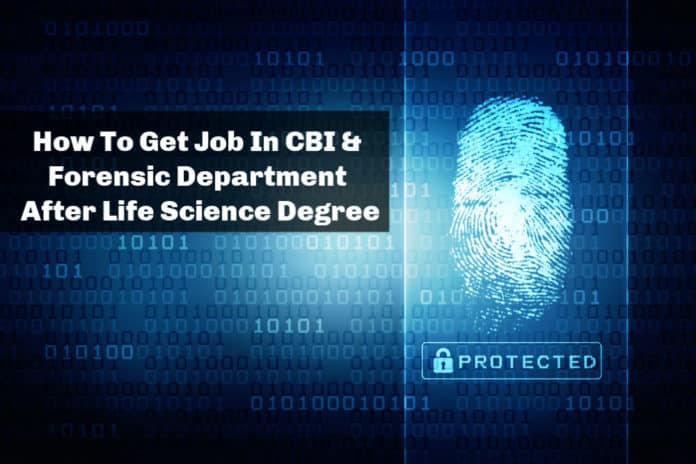How To Get Job In CBI & Forensic Department After Life Science Degree
The alarming rate at which crime is increasing all over the world is a matter of deep concern. To be practical crime & criminals can never be eradicated completely from the society hence the need of a Forensic Scientist is a necessity in all city, states & countries. In order to ensure quick & correct justice to be passed, a major role is being played by a Forensic Scientist. They look at a crime scene with a scientific mind and analyze pieces of evidence to help the legal system. Many students who are in their life science graduation or post graduation level are unaware that they can make their career in this domain too. To understand in depth How To Get Job In CBI & Forensic Department After Life Science Degree, we must first understand what is Forensic Science & what are the job responsibilities of a forensic scientist.
Forensic science is one of the most sought-after avenues. The term forensic is obtained from Latin word “forensis” that means “of or before the forum. A forensic scientist may work as a freelancer or may be associated with departments like the Central Bureau of Investigation (CBI) & Intelligence Bureau (IB), Central Forensic Science Laboratory (CFSL). They can also be employed in the government sector, where they work in different law enforcement agencies and investigation departments such as police, investigative services of state and central government and legal system.
Table of Contents
Role of a Forensic Scientist
Forensic scientists help in criminal investigations by performing the following duties:
- Collect, identify and classify physical evidence pertaining to a crime scene or suspect
- Collect data, photograph, and pieces of evidence like blood smear, fingerprints, bullets to help understand the past events in the area.
- They are responsible for documenting the evidence
- Their investigations are conducted independently to avoid partiality.
- The evidence is tested. With detailed analysis, records are prepared for each case
- May be required to reconstruct accident scene to trace past events.
- These pieces of evidence may be used during criminal trials to testify and explain the suspicions.
The path to becoming a Forensic scientist
Step 1: Complete Class 12 with a good academic record. A scientist must have strong basics to be able to handle investigations on their own.
Step 2: Earn a Bachelor’s degree to be able to be eligible for a career in Forensic science. One may also choose to complete their graduation in Chemistry, Biology, Microbiology, Zoology, Applied Sciences or Physiology. It is always advised to have a deep knowledge and hands-on experience with various techniques used for analysis. One may complete certifications in the same.
Step 3: One may also obtain a graduate degree and/or post graduation degree in Forensic Science itself. There are both graduation and post-graduation courses offered in Forensic Science in various institutes, few of which have been listed below.
- Gujarat Forensic Sciences University
- National Institute of Criminology & Forensic Science
- Lovely Professional University
- Amity University
- Dr. Babasaheb Ambedkar Marathwada University
- Swami Vivekananda University
- Deen Dayal Upadhaya college
- Sri Guru Tegh Bahadur Khalsa College
- St. Xavier’s college
- University of Madras
- Dr. Bhim Rao Ambedkar University
- Dr. Hari Singh Gour University
Step 4: To have a successful career, it is essential to narrow down your specialty. For instance, if you work with DNA analysis, it is wise to complete additional courses in that field. Certifications and hands-on experience are always welcome.
There are many specializations offered under Forensic science. If presented with an opportunity to complete a course on the same, it would be advisable to take it. A few of them have been listed below.
- Forensic Biology
- Forensic Chemistry
- Forensic Entomology
- Forensic Ballistics
- Forensic Botany
- Forensic Serology
- Forensic Toxicology
Step 5: Some job requirements may be purely medical. For example, a medical report creation or a medical examination can only be done by a doctor. Hence, one may also qualify MBBS and MD or a pathology degree before switching to the field of Forensics.
Step 6: Earn an associate in Law enforcement if you want to be able to be a crime scene investigator. It even allows one to testify in court cases when the need arises.
Step 7: It is essential to obtain a Master’s degree in Science along with a NET certification in Forensic Science to be eligible to teach the subject in college. In certain scenarios, a Doctorate degree may also be required. Example a doctorate in Molecular Biology may be a suitable candidate for teaching the analytical techniques.
Step 8: On the job Training. The more experience you can gain, the easier it is to switch or pick a career. Especially in Forensic Science, experience gives you better judgment and analysis.
Forensic science fields and their eligibility
Forensic Biology – This field can be pursued after a degree in either Forensic science or Biological Sciences. A scientist is required to apply biology to identify a crime suspect by DNA sample analysis or even mitochondrial sample analysis. In order to this, a candidate must be strong in the basic biology and must be able to understand biological systems well. Then they will be able to analyze the anomalies associated with a crime scene.
Forensic Pathology – Forensic Pathologists carry out autopsies to establish the cause of death. They identify the injuries, associate them with the type of weapon used, and are responsible for the collection and maintenance of the exhibits. They generally are from a medical background. There may be requirements for Microbiologists as there may be analysis required of various human samples.
Forensic Toxicology – They are concerned with the identification of foreign chemicals, poison or drugs administered in the victim’s body. They may fall under –
(a) Analytical Toxicology involving chemical analysis of viscera using sophisticated techniques. The essential qualification is M.Sc. or Ph.D. in Toxicology/Forensic Science.
(b) Poison information involving in providing information relating to the nature of poisons. The basic qualification is an MBBS.
(c) Management of acute and chronic toxicity caused by poisonous substances, for which the basic qualification again is an MBBS.
Forensic Psychiatry – This field determines the mental health of the criminal when they testify whether or not the crime was conducted.
Forensic Microbiologists – One can pursue this area after a degree in Pathology or Microbiology. They are required to trace the biological evidence of a case. Starting from analyzing the food consumed by the victim to analyzing body samples and excreta, a scientist may be required to ascertain the cause of death.
Forensic Fingerprint Experts – They can join after a degree in Genetics or Molecular Biology. They are needed for the identification of fingerprint samples which can be used in pedigree analysis and establishing paternity and maternity. This has now been computerized and the data is even used to trace suspects immigrating to other nations.
Additional Documents required for a career in Forensics:
Every department operating with Forensic Science may have their own requirements for selection. A few of the well-noted criteria are given below.
- Identification and Citizenship proof
- Academic documents
- Certification in the specialized field intended to join
- May be required to clear NET in Forensic Science
- May require a police clearance certificate for a background test.
- Medical test to prove sanity and eligibility.
- May require a medical science degree
Forensic science as a career
The minimum qualification required to begin a career in Forensic Sciences is Graduation. A lot of career path choices can be made. Some choose the field of education, while others choose the analytical work.
Though someone pursuing forensic science might initially start their education with many of the same courses as others in the program, they will eventually are required to specialize through certain additional courses that lead them onto their own path. Below is a list of a few of the most common forensic science careers and the responsibilities allocated to them.
- Forensic Science Technician (Bachelor’s degree in Natural Science and on the job training)
Forensic science technicians may require to work in one of two areas: They inspect crime scenes, collect and analyze the evidence present in the field, or they work in the laboratory, where they perform tests and analyze the evidence collected. Both responsibilities are equally important and require precision, following proper protocol to sustain evidence chain of custody, and submitting reports. Technicians may be required to specialize in a variety of areas for example fingerprint analysis or digital forensics.
- Medical Examiner (Doctoral degree in medicine)
Medical examiners perform autopsies and medicolegal examinations, which include locating and assessing body injuries, trauma, and hence determining the cause of death while identifying victims. They may be required to interview those who discovered the body or to re-create a crime scene to ascertain past events. They evaluate photographs of the crime scene and look through the medical history information on the victim. They may be required to issue death certificates and determine the cause and manner of death.
- Forensic Psychologist (doctoral degree in Psychology)
Often, a criminal can be identified by studying a person’s character and behavior. Forensic psychologists intersect psychology and the law. They often associate with people in the legal system, including lawyers, judges and police officials, to evaluate those who have been accused or convicted of crimes. They might evaluate perpetrators to determine the risk of recidivism or help victims deal with the trauma they have encountered or even decide whether someone is fit to stand trial.
- Latent Fingerprint Examiner (Bachelor’s degree in science and extensive training)
These forensic scientists are highly specialized in identifying, analyzing and lifting fingerprints at a crime scene. There may be field work required or they may be required to stay in the lab to analyze the prints and submit their reports. These reports may be presented to the appropriate law enforcement officials.
Apart from these career fields, there are some which have recently been developed. For example, for a very violent crime scene, there may be Bloodstain Pattern Analysts. They check the blood spatter, associate it with the instrument and the victim and predict whether the wounds were self-inflicted or the direction of movement of the culprit etc. Often these data are used by insurance companies to filter false claims from authentic ones.
Forensic Ballistic Experts identify the bullet used and the wound inflicted. They can trace the weapon used for the assault. There are even document examiners to assess the documentation work of the case. There can be polygraph test analyzers who can help in the criminal investigation by analyzing the authenticity of statements given.
Conclusion:
It is never late to decide your career path. Life science is a vast field. There are numerous employment avenues under it. Forensic Science is one such area which beckons students passionate about crime investigation and bringing justice to society. There are various techniques learned under applied biology that are required in forensic analysis. Also, individuals strong in understanding biological processes and systems can help in analyzing evidence related to a crime scene. The only thing required is a good academics record and a Bachelor’s degree in Science. With hands-on training in the job assigned, one will be able to master the skills needed for becoming a Forensic Scientist.
 most experienced senior team members of Biotecnika. Coming from a research background in cancer, she specializes in Cancer Genetics, Immunology & Developmental Biology. Her experience in the Ph.D. Exam & Selection field is vast. She has a keen interest in understanding the latest developments in Biotech & Pharma Industry and is very passionate about educating the same to her students. She is one of the favorites among her students.
most experienced senior team members of Biotecnika. Coming from a research background in cancer, she specializes in Cancer Genetics, Immunology & Developmental Biology. Her experience in the Ph.D. Exam & Selection field is vast. She has a keen interest in understanding the latest developments in Biotech & Pharma Industry and is very passionate about educating the same to her students. She is one of the favorites among her students.Keywords: Forensic science, Forensic scientists, Forensic science scope, Forensic Science career, Forensic science job, Forensic science job in CBI, Forensic science job in Forensic department, Criminology & Forensic Science, Life science candidates can do forensic science, the career path for forensic science, how to become a forensic scientist.







































I’m working as an Assistant Professor in SGTB Khalsa College in the Forensic Science Unit. The content of the article is wonderful and depicting the current scenario appropriately.
Also Institute of Forensic Science, Mumbai.
It is a Govt. Of Maharashtra Institute, mumbai university.
Offers :1) Bachelors in forensic science.(3years)
2)Masters cource in Forensic science and in Cyber Forensics.(2years)
3) Post Graduate Diploma in Forensic Science.(1 year)
4)Post graduate Diploma in Digital and Cyber Forensics.(1 year)
I have high interests in forensic science. I have completed my masters in Biotechnology with 1st class and my bachelor’s degree was on biochemistry with honours. How can I pursue my career as forensic biologist?